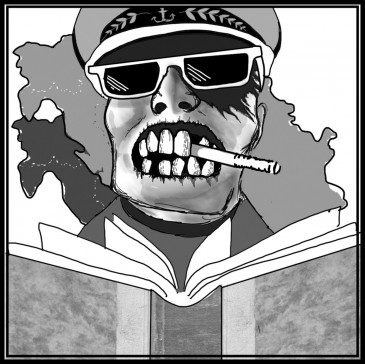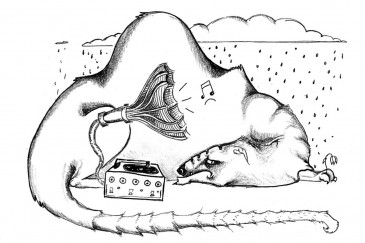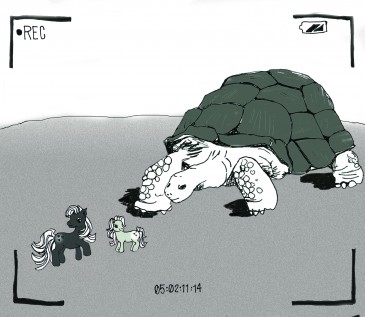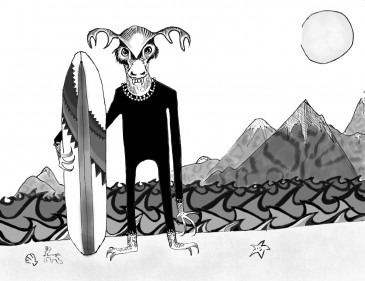
Tito on Ice is a punk-rock political road documentary that follows comic book creators Max Andersson and Lars Sjunnesson as they travel throughout former Yugoslavia in promotion of their new book, Bosnian Flat Dog.
Before embarking on their journey, Andersson and Sjunnesson create a creepy corpse-like sculpture of Marshal Tito, the benevolent dictator that ruled ex-Yugoslavia for nearly three decades. The mummified Tito, made of paper mâche and other waste materials, is a sort of Dadaist assemblage that accompanies the duo on their quest to uncover the regions’ communist past by interviewing local artists.
Their journey is captured using a low-resolution video camera and the live footage is intercut with animation made from cardboard scraps. The cardboard cut-outs are shot on black and white 8mm film, resulting in choppy animation that is, at first, uncomfortable to watch.
But as the strange and upbeat Balkan soundtrack enhances the frenetic pacing, the film begins to take on a pulse of its own. The jarring jump cuts between live action and animation, combined with the obscure ‘60s surf-rock, ‘70s post-punk, and ‘80s new wave, is so satisfyingly bizarre, it begins to feel like a graphic novel come to life.
Local writers, artists, and musicians act as historians to provide an illuminating account what life was like under Tito, as well as the current struggles facing those living in the former republic. Although interviewees are quick to explain how Tito cleverly subverted democracy in favour of strict authoritative measures, the former leader is often venerated.
In a region that has been stained by civil war in recent years, you can’t help but admire Titoism for maintaining economic and cultural stability for upwards of 30 years. The sentiment is evident when Andersson and Sjunnesson attempt to cross the Croatia-Bosnia border with the Tito sculpture. Surprisingly, the guards are not offended by the grotesque mummy, but laugh and ask to have their photo taken with it.
Onward to Mostar, Bosnia, where two local poets started an “Alternative Institute.” In recent years, the Institute hosted lectures, concerts, and art shows. As one of the founders explains, the Institute became the only place in post-war Bosnia that encouraged real reconciliation between Serbs and Croats. Due to threats of violence and a lack of support from local authorities, the Institute is no longer operating. With this, it is clear that socialist revolution is not a historical fact in ex-Yugoslavia’s past, but rather something creative communities are still fighting for. It’s a struggle that has been initiated, but has yet to actualize.
Overall, Tito on Ice is weird, informative, and does something only great films do: it harmonizes form and content into a perfect cinematic rhythm. Surrealist absurdity, constructivist montage, and good old-fashioned cinema vérité oscillate to open up the complex realities of a tried and failed version of socialism. Such aesthetic interplay evokes the political dichotomies that ex-Yugoslavia, and arguably all nations, continue to be confronted with (capitalism vs. socialism, nationalism vs. communism).
The DIY animation, jarring edits, and punk soundtrack, juxtaposed against the quiet despondent post-war townships Andersson and Sjunnesson visit, acts as a call to action. It wakes and shakes the viewer out of our Hollywood slumber and forces us to consider who the true revolutionaries are (hint: they aren’t the politicians).
Upcoming Documentary Screenings
Far from Vietnam, directed by Chris Marker
December 10th, Djavad Mowafaghian Cinema (SFU Woodward’s Vancouver)
Hi-Ho Mistahey!, directed by Alanis Obomsawin
January 18th, The Theatre (SFU Surrey)
Alcan Highway, directed by Aleksi Salmenperä
January 21st, Kay Meek Centre (West Vancouver)
In Real Life, directed by Beeban Kidron
January 30th, Capilano University Bosa Theatre (North Vancouver)





